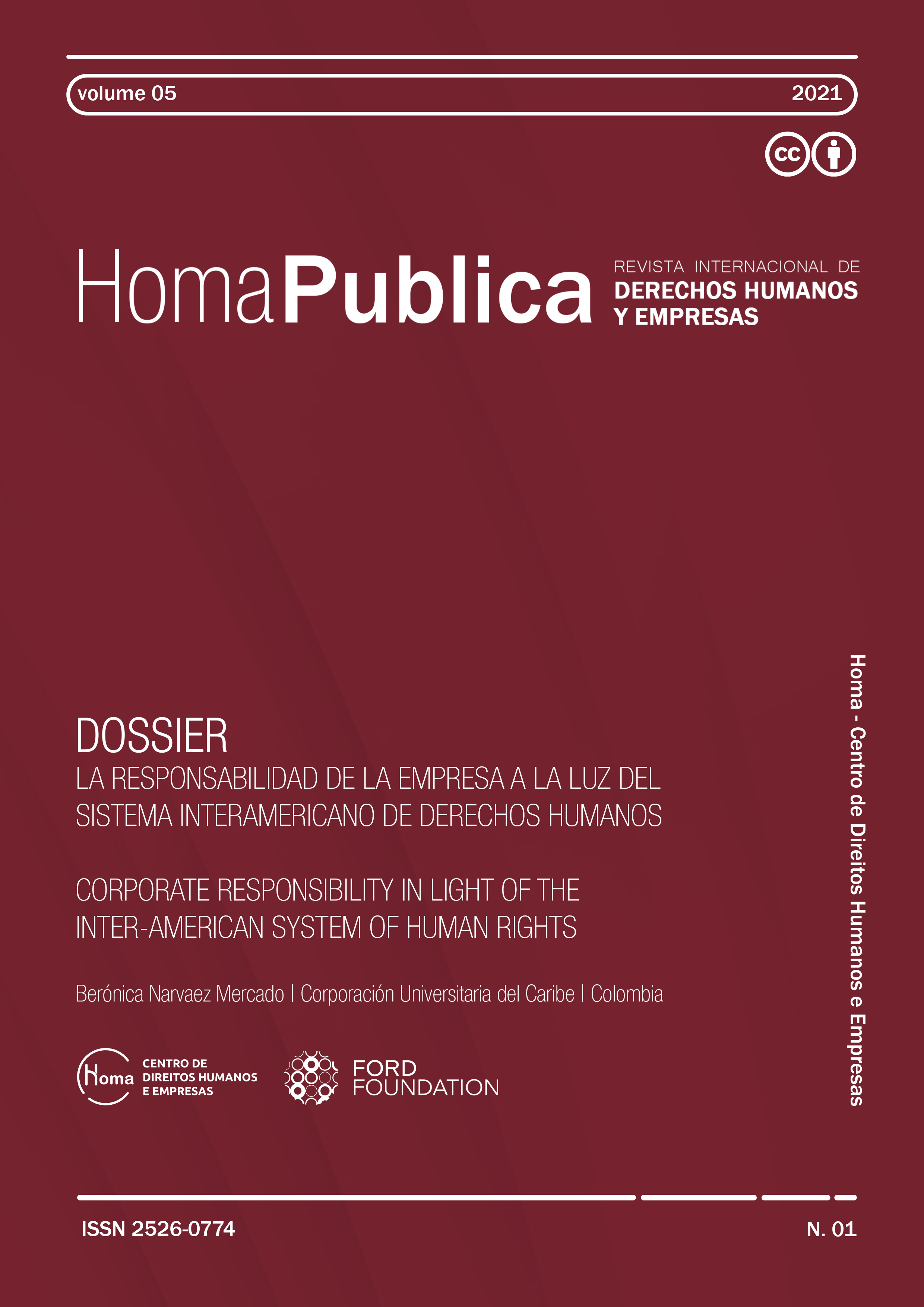The labor exploitation of undocumented migrants in the face of corporate logic: an analysis of the Inter-American Court of Human Rights Advisory Opinion OC 18/03
Published 2021-06-30
Keywords
- Undocumented Migrants,
- Human Rights,
- Globalization,
- Transnational Corporations,
- Advisory Opinion 18 of 2003 of the Inter-American Court of Human Rights
How to Cite
Copyright (c) 2021 Homa Publica - International Journal on Human Rights and Business

This work is licensed under a Creative Commons Attribution 4.0 International License.
Abstract
Globalization reflects the internationalization of capital and the free movement of goods and people, which intensifies socioeconomic inequalities, making this scenario not accessible to groups with greater social vulnerability, especially undocumented migrants. Therefore, this work aims to understand the condition of these individuals in relation to their labor exploitation in the business environment. This approach is justified because it deals with the reality of migrants and the violation of human rights by companies, mainly transnational corporations. The Critical Theory of Human Rights was used as a framework to analyze Advisory Opinion 18 of 2003 of the Inter-American Court of Human Rights, the first international document to specifically address the guarantee of the rights of undocumented migrants, structuring the debate on violations committed by public and private entities. Finally, we seek to answer whether or not the document is sufficient for the protection of undocumented migrants in the Human Rights and Business agenda, based on the hypothesis that the simple recognition of rights is not enough for its effectiveness, but serves as a baseline for corporate institutions dealing with the subject to be guided by the respect for such rights. The methodology used was direct consultation of the document and literature review. Finally, we conclude that Advisory Opinion 18 is not enough for the realization of the rights it proposes to discuss, but it represents a legitimate framework for guiding the institutions that deal with the subject.
Downloads
References
- Corte IDH. (2003). Parecer Consultivo OC-18/03, de 17 de setembro de 2003, solicitado pelos Estados Unidos Mexicanos: A condição Jurídica e os Direitos dos Migrantes Indocumentados. Acesso em 13 de maio de 2021: https://www.corteidh.or.cr/docs/opiniones/seriea_21_por.pdf
- Crivelli, E. (2010). Direito internacional do trabalho contemporâneo. São Paulo: LTr.
- Filho, M. de C. C. & Feres, M. V. C. (2015). Ordem normativa institucional a partir do pensamento de Axel Honneth. Revista do Programa de Pós-Graduação em Direito da UFC. v. 35.
- Giddens, A. (2005). A terceira via: reflexões sobre o impasse político atual e o futuro da social-democracia. 5 ed. Tradução de Maria Luiza X. de A. Borges. Rio de Janeiro: Record.
- Herrera Flores, J. (2009). A (re)invenção dos direitos humanos. Florianópolis: Fundação Boiteux.
- Honneth, A. (2003). Luta por reconhecimento: a gramática moral dos conflitos sociais. Tradução de Luiz Repa. São Paulo: ed. 34.
- Hunt, L. (2009). A invenção dos direitos humanos - Uma história. São Paulo: Cia. das Letras.
- Mello, C. A. B. (2010). O conteúdo jurídico do princípio da igualdade. São Paulo: Malheiros Editores.
- MigraMundo Equipe. (2020). Estudo descarta relação entre imigrantes indocumentados e aumento da violência nos EUA. MigraMundo. Acesso em 10 de maio de 2021. https://migramundo.com/estudo-descarta-relacao-entre-imigrantes-indocumentados-e-aumento-da-violencia-nos-eua/
- Organização das Nações Unidas. (2019). Número de migrantes internacionais no mundo chega a 272 milhões. ONU News. Acesso em 12 de maio de 2021. https://news.un.org/pt/story/2019/11/1696031.
- Piovesan, F. (2010). Direito ao trabalho e a proteção dos direitos sociais nos planos internacional e constitucional. In PIOVESAN, F.; CARVALHO, L. P. V. Direitos humanos e direito do trabalho. São Paulo: Atlas, p. 3-31.
- Quijano, A. (2005). Colonialidade do poder, eurocentrismo e América Latina. In.: LANDER, Edgardo (org.). A Colonialidade do Saber - Eurocentrismo e Ciências Sociais - Perspectivas Latino-americanas. Buenos Aires: Clacso.
- Roland, M. C., Angelucci, P. D., Neto, A. A. D., Carvalho, L. D., Barbosa, L. V.; Carvalho, M. F. C. G. (2016). As obrigações dos Estados de origem - suas obrigações extraterritoriais nas violações de Direitos Humanos por corporações transnacionais. Juiz de Fora: Homa.
- Roland, M. C., Soares, A. O., Brega, G. R., Oliveira, L. de S., Carvalho, M. F. C. G., Rocha, R. P. (2018). Cadeias de Valor e os impactos na responsabilização das empresas por violações de Direitos Humanos. Cadernos de Pesquisa Homa. 1(5). Juiz de Fora: Homa.
- Saladini, A. P. S. (2012). Trabalho e Imigração: os direitos sociais do trabalhador imigrante sob a perspectiva dos direitos fundamentais. São Paulo: LTR.
- Santos, B. de S. (1997). Por uma concepção multicultural de direitos humanos. Revista Crítica de Ciências Sociais. (48). Coimbra.
- Santos, B. de S. (2003). (org.). Reconhecer para libertar: os caminhos do cosmopolitismo cultural. Rio de Janeiro: Civilização Brasileira.
- Santos, M. (2010). Por uma outra globalização: do pensamento único à consciência universal. 19 ed. Rio de Janeiro: Record.
- Senra, L. M. (2016). O Princípio da Centralidade do Sofrimento da Vítima e Seus Reflexos na Prestação Jurisdicional Brasileira: Uma Análise do Crime de Mariana. [Dissertação de Monografia, Universidade Federal de Juiz de Fora].
- Singer, P. (2001). Globalização e desemprego: diagnóstico e alternativas. 4ª ed. São Paulo: Contexto.
- Trindade, A. A. C. (2006). Memorial por um novo jus gentium, o Direito Internacional da Humanidade. In: Trindade, A. A. C. (Org.). A Humanização do Direito Internacional. Belo Horizonte: Editora del Rey. p. 394-409.
- Zubizarreta, J. H. & Ramiro, P. (2016). Against the ‘Lex Mercatoria’: proposals and alternatives for controlling transnational corporations. Madrid: OMAL.

